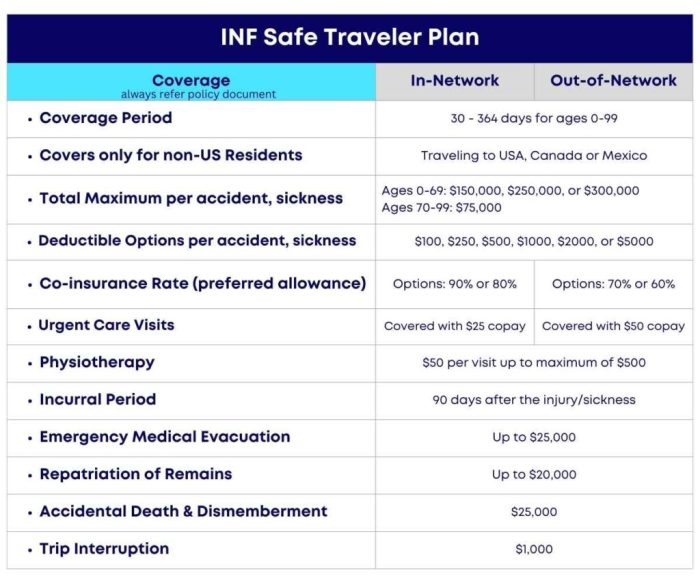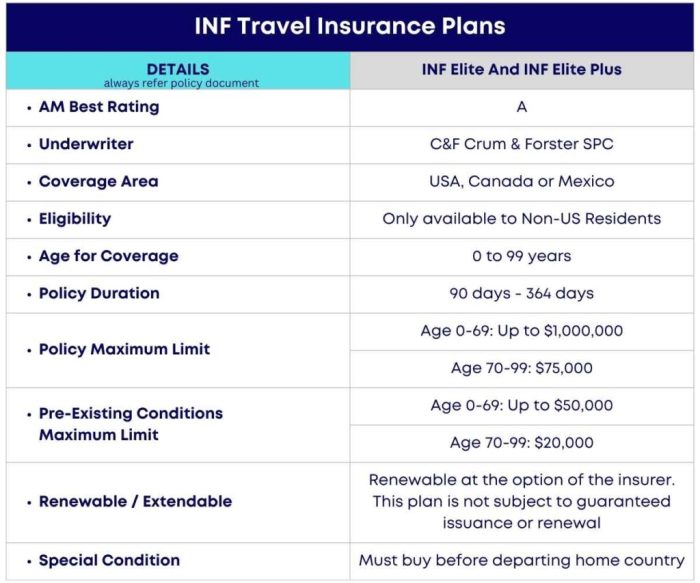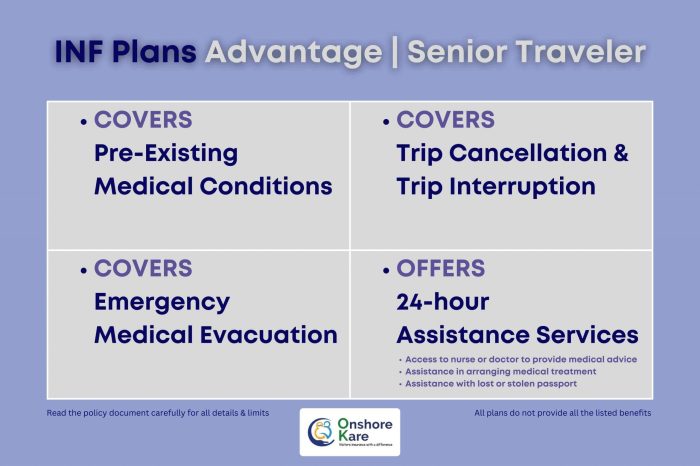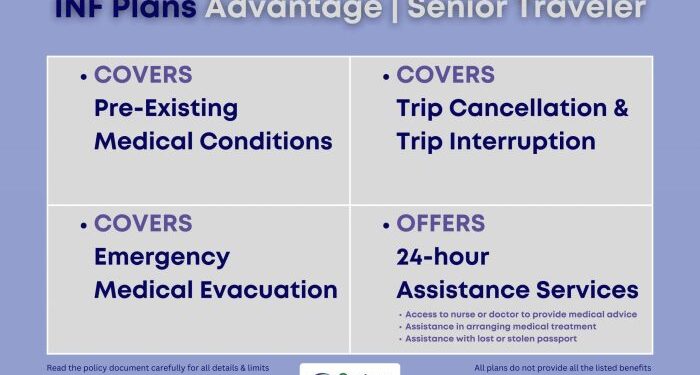As inf travel insurance becomes a crucial aspect of trip planning, this guide invites readers into a world of valuable insights and essential information. From understanding the basics to exploring key features, embark on a journey that ensures your travels are not only memorable but also protected.
Delve into the specifics of different travel insurance policies and discover the factors that can influence your choice, all while gaining a deeper appreciation for the peace of mind these policies offer.
What is travel insurance?

Travel insurance is a type of insurance coverage that provides financial protection and assistance for unexpected events that may occur during a trip. It is designed to help travelers deal with emergencies, medical expenses, trip cancellations, and other unforeseen circumstances while away from home.
Types of coverage in travel insurance
- Medical Coverage: This includes medical emergencies, hospital stays, and medical evacuation.
- Trip Cancellation/Interruption: Reimburses you for prepaid, non-refundable trip expenses if you have to cancel or cut short your trip for a covered reason.
- Baggage Loss/Delay: Covers the loss, damage, or delay of checked or carry-on luggage.
- Travel Assistance: Provides 24/7 assistance for emergencies, such as lost passports, legal issues, or emergency cash transfers.
Importance of having travel insurance
Travel insurance is essential for safeguarding your investment in a trip and ensuring peace of mind while traveling. Here are some reasons why having travel insurance is important:
- Protection against unforeseen events: Travel insurance can help cover unexpected medical emergencies, trip cancellations, or lost luggage, reducing financial risks.
- Peace of mind: Knowing that you have coverage in place can alleviate stress and allow you to enjoy your trip without worrying about potential mishaps.
- Emergency assistance: Travel insurance provides access to emergency assistance services, including medical referrals, translation services, and emergency cash advances.
Types of travel insurance policies
Travel insurance policies come in various types to cater to different needs and situations. Here are some common types of travel insurance policies along with their coverage and benefits:
Single Trip Insurance
Single trip insurance covers a specific trip for a set period. It typically includes coverage for trip cancellation, trip interruption, emergency medical expenses, and baggage loss. This type of policy is ideal for travelers planning a one-time vacation or business trip.
Annual/Multi-Trip Insurance
Annual or multi-trip insurance provides coverage for multiple trips within a year. It offers convenience and cost savings for frequent travelers who take several trips annually. The policy includes similar coverage as single trip insurance but for multiple journeys.
Family Insurance
Family insurance is designed to cover the entire family traveling together. It often includes coverage for children under a certain age traveling with their parents. This policy is beneficial for families going on vacations together as it offers protection for everyone in the group.
Senior Insurance
Senior insurance caters to older travelers and includes coverage tailored to their specific needs, such as pre-existing medical conditions and emergency medical evacuation. This type of policy is ideal for seniors who want comprehensive coverage that addresses age-related concerns during travel.Each type of travel insurance policy serves a specific purpose and provides different levels of coverage to suit various travel scenarios.
It's essential to choose the right policy based on your travel habits, frequency, and specific requirements to ensure you are adequately protected during your trips.
Key features of travel insurance
Travel insurance offers various key features that provide protection and peace of mind to travelers. These features can vary depending on the policy, but some common ones to look for include:
Trip cancellation coverage
Trip cancellation coverage protects you in case you need to cancel your trip due to unforeseen circumstances such as illness, injury, or a natural disaster. This feature typically reimburses you for non-refundable expenses like flights, hotels, and tours.
Emergency medical coverage
Emergency medical coverage is crucial when traveling abroad, as it covers medical expenses in case you get sick or injured during your trip. This feature can include hospital stays, doctor visits, prescription medications, and medical evacuation to a facility with appropriate care.
Baggage loss/delay coverage
Baggage loss/delay coverage helps reimburse you for essential items if your luggage is lost, stolen, or delayed during your trip. This feature can provide funds for purchasing clothing, toiletries, and other necessities until your bags are recovered.These key features not only offer financial protection but also provide peace of mind knowing that you are covered in case of unexpected events.
When comparing travel insurance policies, consider the extent of coverage for each feature, any exclusions or limitations, as well as the overall cost and reputation of the insurance provider
Factors to consider when choosing travel insurance

When selecting a travel insurance policy, there are several factors that travelers should consider to ensure they have the appropriate coverage for their trip. Each factor plays a crucial role in determining the type of insurance needed and the level of protection required.
Destination
The destination of your trip is a critical factor in choosing the right travel insurance. Some regions may have higher risks of natural disasters, political unrest, or health issues. It is essential to select a policy that includes coverage for specific risks associated with your destination.
Durations of Trip
The duration of your trip also impacts the type of travel insurance you should choose. Longer trips may require more extensive coverage, including provisions for trip cancellation, trip interruption, or medical emergencies that may occur over an extended period.
Activities Planned
The activities you plan to engage in during your trip can influence the coverage you need. Adventure sports, extreme activities, or hazardous excursions may require specialized coverage to protect you adequately in case of accidents or emergencies related to these activities.
Travel Companions
Consider the individuals traveling with you when selecting a travel insurance policy. If you are traveling with family members, seniors, or individuals with pre-existing medical conditions, you may need additional coverage to address their specific needs.
Budget and Cost of Policy
Your budget for travel insurance is an essential factor to consider. While it is crucial to have adequate coverage, it is also necessary to find a policy that fits within your budget. Compare different plans to find the best balance between coverage and cost.
Medical Coverage and Emergency Assistance
Ensure that the travel insurance policy provides sufficient medical coverage and emergency assistance services. Medical expenses abroad can be costly, so having comprehensive coverage for medical emergencies is crucial for peace of mind during your trip.
Policy Exclusions and Limitations
Carefully review the policy exclusions and limitations to understand what is not covered by the insurance plan. Be aware of any restrictions or conditions that may affect your coverage, such as pre-existing medical conditions, high-risk activities, or specific exclusions for certain regions.
Customer Reviews and Reputation
Research the insurance provider's reputation and read customer reviews to assess the quality of service and reliability of the company. Choose a reputable insurer with a track record of excellent customer service and prompt claims settlement.
Assessing Priorities
When deciding on a travel insurance policy, prioritize the factors that are most important for your specific trip. Assess the risks involved, the level of protection needed, and your budget constraints to make an informed decision that meets your travel insurance requirements.
Final Conclusion

In conclusion, navigating the realm of inf travel insurance can be complex, but armed with the right knowledge, you can make informed decisions that enhance your travel experiences. Remember, preparation is key, and with the right policy in place, you can explore the world worry-free.
Question & Answer Hub
What does travel insurance typically cover?
Travel insurance usually includes coverage for trip cancellations, medical emergencies, and lost baggage.
Are pre-existing medical conditions covered by travel insurance?
Most travel insurance policies do not cover pre-existing medical conditions unless specified in the policy. It's essential to check the terms and conditions.
Can I purchase travel insurance for a single trip if I travel frequently?
Yes, you can opt for a single trip policy each time you travel or consider an annual/multi-trip policy if you travel multiple times a year.
Is travel insurance necessary for domestic trips?
While travel insurance is more commonly associated with international trips, it can also provide coverage for unexpected events during domestic travel.




![Best Seniors Travel Insurance Over 65 Quotes [Compare Rates]](https://management.vpn.co.id/wp-content/uploads/2025/10/International-Travel-Insurance-For-Seniors-120x86.png)









